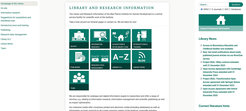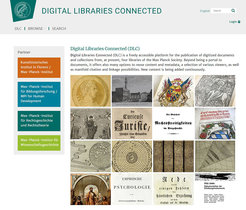Library and Research Information Unit
Last update: July 2023
Head: Sebastian Nix
Academic Librarian: Nicole Engelhardt
Research Data Management Coordinator: Maike Kleemeyer
The Library and Research Information Unit is a central service facility for the support of scientific work in the Institute. It is responsible for the analog and digital supply of information to researchers and research support staff, for whom it also provides services in the areas of research data management (RDM), information research, scientific publishing, and impact optimization. In this way, the team supports research with custom-tailored services throughout the entire research cycle.

Since 2019, taking into account the dynamic changes at the Institute, the unit has been implementing a strategic work program for the demand-oriented further development of its service portfolio. Significant progress has been made in this area.
In 2020, the permanent position of a research data management coordinator was created and filled by a developmental psychologist with a PhD. Since then, research data-related services have been continuously expanded. They range from comprehensive information and training offers to the further development of a software-based platform for the systematic registration of data-based studies and Castellum, a privacy-compliant subject management tool for scientific research. In this context, 1.6 temporary full-time positions for research data-related software development and processes were established in the Library and Research Information Unit in summer 2022.
The generally growing importance of Open Science was recognized with the implementation of a workshop offer within the framework of the in-house RDM and Open Science working group. A second focus was the significant expansion of services for publishing in Open Access (OA).
At the same time, the intranet site was extensively relaunched in terms of structure and content, including a differentiated FAQ section on scientific publishing, copyright, and OA. The COVID-19 pandemic also caused the acceleration of the demand-oriented expansion of the e-book portfolio, both through the purchase of and temporary subscription to e-books. New evidence-based acquisition models for e-books are also being tested, based on an analysis of the book collection development in recent years. With the goal of optimizing the use of existing staff resources, proactive acquisition activities have been scaled back in favor of a model in which researchers are informed about potentially relevant new publications on the national and international scholarly book market, based on automated data extraction from various bookstore sources, and can then seamlessly order titles of interest electronically via interlibrary loan, document delivery services, or for purchase. By implementing the LibKey Link service, it was possible to improve access to information resources subject to licensing from search platforms such as Google Scholar or the Web of Science. The monthly (E-)Books Selection service, available as a push service, provides information about 25 intellectually selected, particularly interesting new book acquisitions (e-books and printed books). Another new service, Thematic Alerts, offers researchers the opportunity to receive targeted information by email about new publications that are particularly relevant to their ongoing research, based on thematically tailored search profiles in renowned subject databases from a wide range of disciplines.
For the structural further development of the library space into an “Information, Communication & Concentration Space,” including coworking space elements, a comprehensive concept was submitted to the Administrative Headquarters of the Max Planck Society at the end of 2021, which is to be implemented as part of a dedicated construction measure. Even if a timely realization is not foreseeable due to generally uncertain framework conditions, new space utilization scenarios have already been implemented within the scope of the given possibilities, e.g. the setting up of a video conference area with modern technical equipment in the journal reading room that can be booked house-wide, and the addition of two provisional reading booths.

Finally, the team also cooperated closely with other Max Planck Society institutions to implement new services and promote professional exchange: In February 2021, the relaunch of Digital Libraries Connected (DLC), a publication platform for digital documents and collections, was successfully completed in cooperation with three other Max Planck Institutes. In addition, together with 11 other institutes, a Max Planck Society internal application for project funding was successfully submitted for MPG.Discovery, a powerful, institute-specific, customizable search engine for research-relevant resources from a wide variety of data sources from within and outside the Max Planck Society. Collaboration in various working groups within the Max Planck Society on topics such as OA was also successfully continued.
In 2023, the team will continue to work actively on the strategic realignment of its services, also in the context of an institute-wide strategy process. For example, from the results of a qualitative in-depth analysis of the service needs of researchers—this is a cooperative project with the Institute for Library and Information Science at Humboldt-Universität zu Berlin—new directions for the service portfolio and job assignments will be derived.

